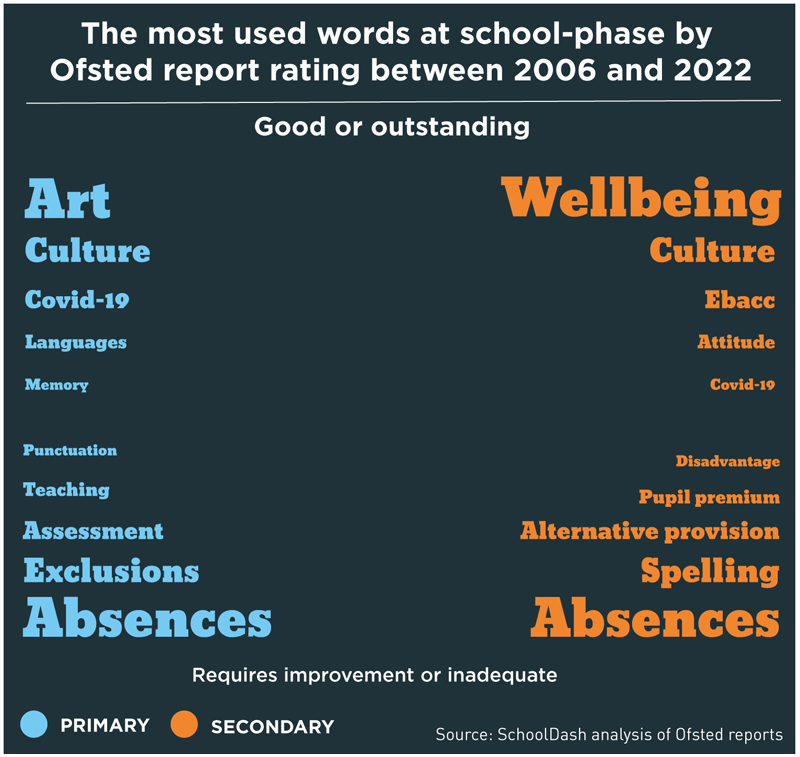Ofsted inspectors are more likely to mention exclusions and absences in negative Ofsted inspections, whereas words such as “art”, “culture” and “wellbeing” feature more often in reports on top-rated schools, new analysis shows.
SchoolDash said its snapshot data “tells us something about Ofsted’s past and present preoccupations”.
Analysis of about 60,000 Ofsted mainstream state school reports since 2006 looked at the words that appeared most often in reports on ‘good’ and ‘outstanding’ schools, and compared them with inspections of ‘requires improvement’ and ‘inadequate’ settings.
“Art”, “culture” and “Covid-19” were the top three words most likely to come up in positive primary school inspections, whereas “assessment”, “exclusions” and “absences” were more likely to crop up in negative reports.
It’s a similar pattern at secondary level, where “wellbeing”, “culture” and “Ebacc” (the English Baccalaureate accountability measure) were frequently used in top rated inspections, compared with “absences”, “spelling” and “alternative provision” in those with poor ratings.

‘Technology’ and ‘British values’ more commonly used
Trends have shifted over time too. Since September 2021, under the new inspection framework, words such as “destinations”, “art”, “technology”, “English and maths” and “science” have become more common in positive secondary reports.
“British values”, “attainment”, “computing” and “English as an additional language” have become more frequent in reports of schools with negative grades.
Timo Hannay, from SchoolDash, said: “On a practical level, if your inspectors are taking an overt interest in school culture, pupil wellbeing or art – or, more recently, in science and technology – then, at least statistically speaking, you would appear to be in good shape.
“On the other hand, if they’re unduly concerned about absences, exclusions or British values then you might need to prepare that most British of all attributes, a stiff upper lip.”
Julie McCulloch, policy director at the leaders’ union ASCL, said it was “concerning” exclusions and attendance featured so heavily in negative judgments.
“While these are crucial issues that schools have responsibility for, they also reflect wider problems. Current accountability metrics, including Ofsted grades, correlate closely with factors not necessarily within a school’s control.”
Schools need ‘consistent’ inspection approach
Schools Week dug out some reports where the most prominent words feature.
At ‘inadequate’ Tendring Technology College, a secondary academy in Essex, Ofsted said in 2021 that pupils’ “understanding of health relationships, fundamental British values and protected characteristics is underdeveloped”.
Meanwhile at Admiral Lord Nelson secondary in Hampshire, Ofsted said the ‘good’ school had “very good systems in place to secure the wellbeing and safety of pupils”.
James Bowen, policy director at the National Association of Headteachers, warned against over-interpreting the data, but said schools needed to know there was a “consistent approach to inspection and that outcomes do not depend on the nature” of the inspection team.
“We know that one of the biggest frustrations for school leaders is the way some inspectors become seemingly obsessed with individual and sometimes quite narrow lines of enquiry.
“A one-off comment or single piece of evidence can lead to inspectors narrowing their focus and losing sight of the wood for the trees.”
Ofsted declined to comment.
















Your thoughts